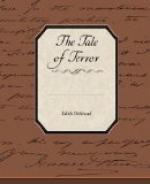“I suddenly saw my brother’s face looking out from among the trees as I passed. I saw the features as distinctly as if the meridian sun had beamed upon them... It was by degrees that the features showed themselves thus out of what had been a formless shadow. I gazed upon it intently. Presently it faded away by as insensible degrees as those by which it had become agonisingly clear. After a short time it returned.”
Godwin describes a ghost as deliberately and exactly as he would describe a house, and his delineation causes not the faintest tremor. Having little imagination himself, he leaves nothing to the imagination of the reader. In his Lives of the Necromancers, he shows that he is interested in discovering the origin of a belief in natural magic; but the life stories of the magicians suggest no romantic pictures to his imagination. In dealing with the mysterious and the uncanny, Godwin was attempting something alien to his mind and temper.
In Godwin’s St. Leon the elixir of life is quietly bestowed on the hero in a summer-house in his own garden. The poet, Thomas Moore, in his romance, The Epicurean (1827), sends forth a Greek adventurer to seek it in the secret depths of the catacombs beneath the pyramids of Egypt. He originally intended to tell his story in verse, but after writing a fragment, Alciphron, abandoned this design and decided to begin again in prose. His story purports to be a translation of a recently discovered manuscript buried in the time of Diocletian. Inspired by a dream, in which an ancient and venerable man bids him seek the Nile if he wishes to discover the secret of eternal life, Alciphron, a young Epicurean philosopher of the second century, journeys to Egypt. At Memphis he falls in love with a beautiful priestess, Alethe, whom he follows into the catacombs. Bearing a glimmering lamp, he passes through a gallery, where the eyes of a row of corpses, buried upright, glare upon him, into a chasm peopled by pale, phantom-like forms. He braves the terrors of a blazing grove and of a dark stream haunted by shrieking spectres, and finds himself whirled round in chaos like a stone shot in a sling. Having at length passed safely through the initiation of Fire, Water and Air, he is welcomed into a valley of “unearthly sadness,” with a bleak, dreary lake lit by a “ghostly glimmer of sunshine.” He gazes with awe on the image of the god Osiris, who presides over the silent kingdom of the dead. Watching within the temple of Isis, he suddenly sees before him the priestess, Alethe, who guides him back to the realms of day. At the close of the story, after Alethe has been martyred for the Christian faith, Alciphron himself becomes a Christian.
In The Epicurean, Moore shows a remarkable power of describing scenes of gloomy terror, which he throws into relief by occasional glimpses of light and splendour. The journey of Alciphron inevitably challenges comparison with that of Vathek, but the spirit of mockery that animates Beckford’s story is wholly absent. Moore paints a theatrical panorama of effective scenes, but his figures are mere shadows.




